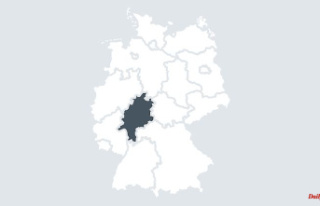Water from a depth of 3,800 meters is said to provide the substance needed for batteries. A study at KIT put opportunities and challenges to the test.
Karlsruhe (dpa/lsw) - According to a study by geoscientists, hot water from a geothermal power plant such as that from the Karlsruhe company Vulcan Energie cannot cover the lithium requirement for the production of batteries in Germany in the medium term. "Basically, the potential is there," said Valentin Goldberg about the results of a study in the journal "Grundwasser". "However, the geothermal lithium can only be a supplement to the imports."
The authors of the study at the Karlsruhe Institute of Technology (KIT) consider an annual production of 2600 to 4700 tons of lithium carbonate equivalent in Germany to be possible if all currently operated geothermal sites with high lithium concentrations are equipped with the appropriate systems. In the Vulcan plant in Insheim in the southern Palatinate alone, it is possible to produce 1,000 to 1,800 tons of lithium carbonate equivalents, said co-author Fabian Nitschke. For Landau, the study estimates the potential at 950 to 1720 tons.
The calculation for Insheim, where the water comes from a depth of 3800 meters, is based on a lithium content of 168 milligrams per liter and a flow rate of 80 liters per second. "These two parameters determine resource availability," Goldberg explained. "If you only look at them, the maximum potential is 2,260 tons - mathematically speaking, more is not possible, even with the most modern technologies." KIT is also researching lithium production.
However, one has to reckon with significant discounts for commercial operation, explained the scientist at the Institute for Applied Geosciences (AGW) of KIT. A system can run for a maximum of 90 percent of the year. And due to the precipitation of different chemical compounds, the lithium cannot be extracted 100 percent. "More realistic is 50 percent."
According to the geoscientists, around 1000 tons per year are realistic at this location. "We would need at least 37 geothermal plants with these ideal conditions to cover the needs of the planned German battery cell production," said Goldberg in an interview with the German Press Agency.
The geothermal power plant in Insheim was put into operation in 2012. Vulcan Energie wants to extract lithium from thermal water there. The activities are currently limited to extraction on a laboratory scale and the development of the technology, explained the Rhineland-Palatinate Ministry of Economic Affairs. "There are currently no applications for the approval of operating plans for the commercial extraction of lithium in the area of the Upper Rhine Graben in Rhineland-Palatinate."
Vulcan recently announced that it had produced high quality lithium hydroxide with the lowest impurity on the market at its Insheim pilot plant. The company has already signed purchase agreements with automobile manufacturers.
So far, there have been two main regions in Germany with the potential for lithium production, said Goldberg. In addition to the Upper Rhine Graben with locations in Rhineland-Palatinate and Baden-Württemberg, this includes a region in the North German Basin. Around 60 percent of global lithium production comes from classic mining operations in Australia, 22 percent from salt lakes in Chile and Argentina. "Demand and production are very divergent," Goldberg said. "We expect a large deficit that will not be covered." This could have serious consequences for the planned expansion of battery cell production in Germany.
The sober presentation of opportunities and challenges is particularly important in this emotionally charged topic, said Goldberg. "It won't work without acceptance."












